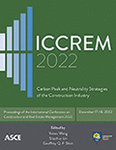Measuring the Complexity of Mega Projects with Markov Chain-Entropy Model
Publication: ICCREM 2022
ABSTRACT
In this study, the Markov chain is used to understand the uncertainty and dynamic evolution characteristics for mega projects, and entropy theory is adopted to quantify the level of complexity; thus a Markov chain-entropy measurement model is established to measure the complexity of mega projects. Markov chains can be used to describe the processes, and entropy can be used to quantify the complexity. The results show that the complexity of mega projects includes six dimensions of organizational complexity, task complexity, technical complexity, environmental complexity, institutional complexity, and social complexity; also complexity has the characteristics of the structure, uncertainty, and dynamic. This research can reveal the relationship between the macro-state and micro-state of mega projects and measure the complexity level. It is helpful for managers to conduct predictive decision-making and control the complexity for mega projects.
Get full access to this article
View all available purchase options and get full access to this chapter.
REFERENCES
Dao, B., Kermanshachi, S., Shane, J., Anderson, S., and Hare, E. (2017). “Exploring and assessing project complexity.” Journal of Construction Engineering and Management, 143(5), 04016126.
Ellinas, C., Allan, N., and Johansson, A. (2018). “Toward project complexity evaluation: A structural perspective.” IEEE Systems Journal, 12(1), 228–239.
Fan, D. P., and Huang, J. (2021). “The contemporary systems thinking and the development of methodology in systems science.” Studies in Dialectics of Nature, 37(11), 9–14. (in Chinese).
Fei, H. H. (2018). Research on Online Reliability Prediction of Component Systems Via Maximum Entropy Markov Model. Southeast University, Nanjing, China, 25–38. (in Chinese).
Flyvbjerg, B. (2014). “What you should know about megaprojects and why: An overview.” Project Management Journal, 45(2), 6–19.
He, Q. H., Tian, Z. D., and Luo, L. (2021). “Build the complexity dimension model of megaprojects in China based on grounded theory.” Forum on Science and Technology in China, (08), 126–134. (in Chinese).
Holland, J. H. (2014). Complexity: A very short introduction, Oxford University Press, Oxford.
Jonkers, R. K., and Shahroudi, K. E. (2020). “Complexity, systems thinking and an integrated systems engineering and project management model.” INCOSE International Symposium, Cape Town, Southern Africa, 546–560.
Li, Y., Han, Y., Luo, M., and Zhang, Y. (2019). “Impact of megaproject governance on project performance: dynamic governance of the Nanning transportation hub in China.” Journal of Management in Engineering, 35(3), 05019002.
Luo, H. T. (2021). “The Evaluation model of ‘the Belt and Road’ economy development and suggestions: Analysis based on AHP and entropy method.” Special Economic Zone, (02), 64–68. (in Chinese).
Luo, L., He, Q. H., Jaselskis, E. J., and Xie, J. X. (2017). “Construction project complexity: Research trends and implications.” Journal of Construction Engineering and Management, 143(7), 04017019.
Zhang, H. T., Zhen, J. Y., and Han, Z. M. (2022). “Complexity analysis and proposal on program management of systems of systems engineering.” Journal of China Academy of Electronics and Information Technology, 17(01), 29–34. (in Chinese).
Zhang, Y. H., Feng, J. C., Li, M., Zhang, K., and Yang, S. T. (2018). “Allocation model of private sectors’ control rights in PPP from perspective of reciprocal preference.” Control and Decision, 33(03), 514–520. (in Chinese).
Zhou, G. E. (2013). “Research on the risk assessment of railroad slope instability based on entropy metric and fuzzy hierarchy method.” Railway Engineering, (6), 101–104+107. (in Chinese).
Zhou, M. M., Wei, Y. L., and Wang, J. P. (2021). “Research on complex project organization structure based on IPT model.” Project Management Technology, 19(02), 83–87.(in Chinese).
Zhu, C. G. (2022). “Research on resilient city construction strategy based on complex adaptive system theory.” China Prices, (03), 40–43.(in Chinese).
Zhu, J., and Mostafavi, A. (2017). “Discovering complexity and emergent properties in project systems: A new approach to understanding project performance.” International Journal of Project Management, 35(1), 1–12.
Information & Authors
Information
Published In
History
Published online: Dec 15, 2022
Authors
Metrics & Citations
Metrics
Citations
Download citation
If you have the appropriate software installed, you can download article citation data to the citation manager of your choice. Simply select your manager software from the list below and click Download.
